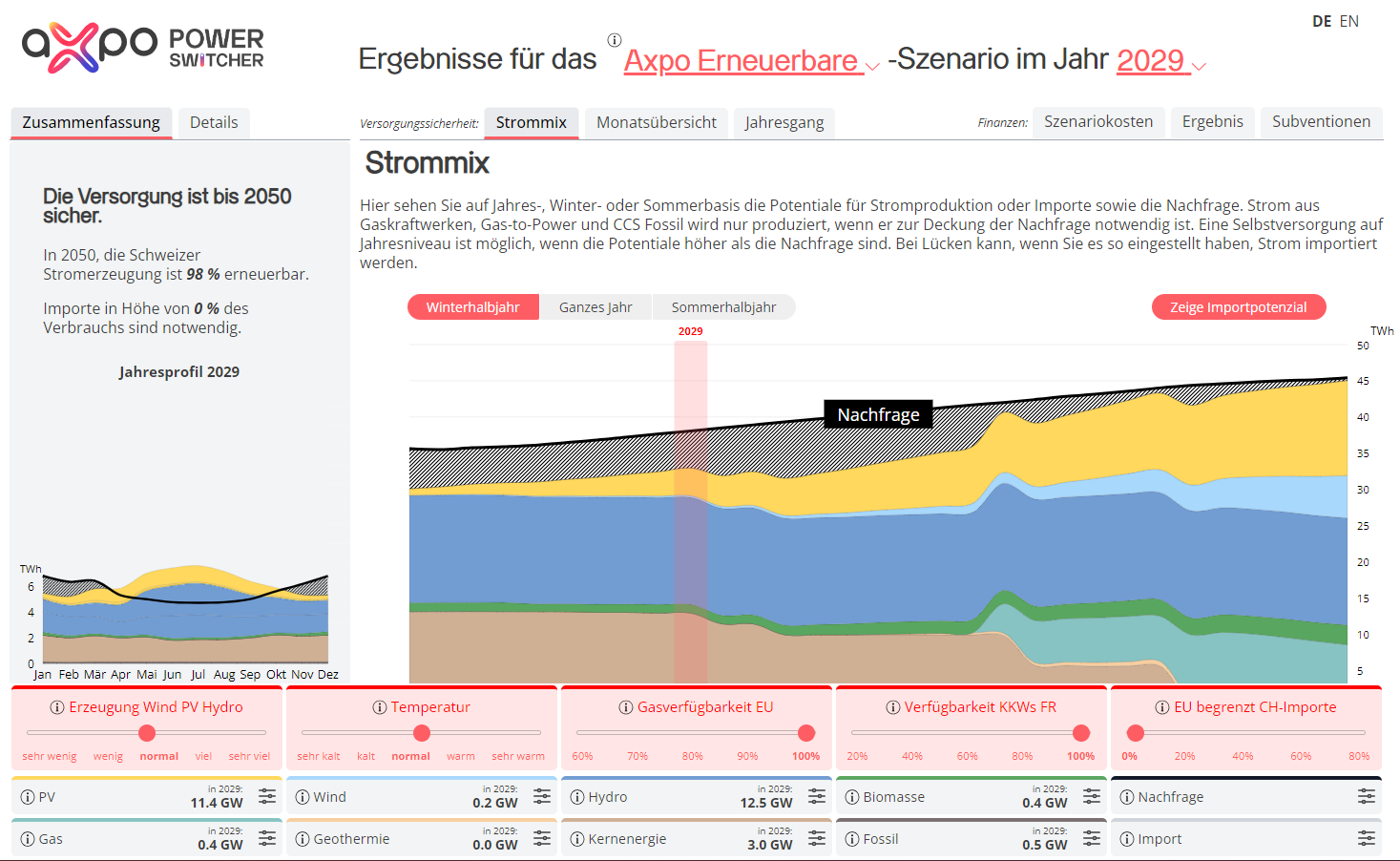

Energy Policy This is how Axpo positions itself on energy policy issues
Amendments to ordinances in the area of the SFOE: Energy Promotion Ordinance and the Energy Ordinance
With the amendment to the Energy Promotion Ordinance and the Energy Ordinance, the federal government plans to reduce the maximum contributions for the promotion of PV systems and to limit the compensation for ecological refurbishment measures at marginal power plants to the Swiss sovereign share. Axpo is of the opinion that these adjustments are not in line with the legislator's intentions and ultimately run counter to the energy policy objectives.
- Statement Axpo Holding AG (German only) View Send email Download
Amendment to the Federal Act on Subsidiary Financial Aid for the Rescue of Systemically Important Companies in the Electricity Sector (FiREG)
Axpo can understand the extension of the temporary FiREG (Federal Act on Subsidiary Financial Aid for the Rescue of System-Critical Companies in the Electricity Industry) in principle. However, the situation is different today due to adapted hedging strategies, new energy market rules and reduced volatility. The provision of a commitment credit in the amount of CHF 10 billion is therefore clearly too high. In addition, the calculation of the provision fee should be based on the market interest rate, the scope of application should be broadened and data queries should be limited to the actual purpose of the law.
- Statement Axpo Holding AG (German only) View Send email Download
Speeding up of the expansion and reinforcement of the electricity grids (amendment to the Ordinance on the Planning Approval Procedure for Electrical Installations)
Axpo welcomes the present amendment to the Ordinance on the Planning Approval Procedure in view of the necessary expansion of the electricity grids. However, the provisions should neither bring about significant changes nor lead to the desired speeding up of procedures in the grid sector.
- Statement Axpo Holding AG (German only) View Send email Download
Ordinance on the central management of electricity supply
The proposed measures represent a serious encroachment on constitutional rights. In the event of a severe electricity shortage, they can be justified - in return for full compensation. However, the compensation provided for in the draft on the basis of production costs does not appear to be constitutional.
- Statement Axpo Holding AG (German only) View Send email Download
Indirect counter-proposal to the popular initiative “Electricity for all at all times (stop blackout)”
Axpo welcomes the Federal Council's indirect counter-proposal and supports the postulated principle of technology neutrality. Lifting the ban on new build does not mean that new nuclear power plants will necessarily be built. However, at least it allows for a constructive debate on the possibility of new nuclear power plants and their inclusion in possible scenarios.
- Statement Axpo Holding AG (German only) View Send email Download
Ordinance on the operation of reserve power plants
Axpo rejects the paradigm shifts associated with the planned amendments to the ordinance for fundamental reasons. A premature call-up of reserve power plants leads to a distortion of the market, while Swissgrid's activities in the areas of electricity generation, distribution and trading or its participation in electricity suppliers contradict the unbundling of the transmission grid and thus the central principle of the liberalized electricity market.
- Statement Axpo Holding AG (German only) View Send email Download
Amendment to the Electricity Act (Faster expansion and conversion of the electricity grids)
Axpo welcomes the planned amendment to the Electricity Act, but emphasizes that the regulations must be more comprehensive and should take into account the entire expansion of the electricity grid at all voltage levels. Focusing exclusively on the transmission grid is not enough to successfully master the challenges of the energy transition. Axpo is calling for an acceleration of procedures and a clear definition of responsibilities. In addition, the distribution grid infrastructure must be given greater focus, as it plays a central role in the security of supply.
- Statement Axpo Holding AG (German only) View Send email Download
Revision of the Electricity Supply Ordinance
There are no valid methodological reasons for switching to an experimental method for calculating the WACC for grid installations and plants for the generation of renewable energy. The low individual consumer savings are offset by uncertainties that may lead to further interventions and inhibit investments.
- Statement Axpo Holding AG (German only) View Send email Download
Amendment to the Spatial Planning Ordinance
The blanket decree is a necessary but not sufficient step on the way to a renewable energy future. Axpo supports this compromise. Unfortunately, the amendment to the Spatial Planning Ordinance does not create the necessary conditions for achieving the energy policy objectives.
- Statement Axpo Holding AG (German only) View Send email Download
Further Statements
- Amendment of the Financial Market Infrastructure Act (German only) View Send email Download
- Implementation of the Federal Act on a Secure Electricity Supply from Renewable Energies (German only) View Send email Download
- Amendment to the Electricity Supply Act (requirements for systemically important companies) (German only) View Send email Download
- Amendment to the Electricity Supply Act (electricity reserve) (German only) View Send email Download
- Federal law on screening foreign direct investment (German only) View Send email Download
- Ordinance on the establishment of a hydropower reserve (German only) View Send email Download
- Amendment of the Energy Act (German only) View Send email Download
- Federal law on a rescue package for the electricity industry (German only) View Send email Download
- Revision of the CO2 law (German only) View Send email Download
- Partial revision of the Spatial Planning Ordinance (German only) View Send email Download
- Subordination of the strategic infrastructures of the energy industry to the Lex Koller (German only) View Send email Download
- Revision of the Decommissioning and Disposal Fund Ordinance (SEFV) (German only) View Send email Download
- Indirectcounter-proposal to the federal popular initiative "For the future of ournature and landscape" (biodiversity initiative) (German only) View Send email Download
- Modification of the ordinance on electric lines (German only) View Send email Download
- Revision of the Energy Act (support measures from 2023) (German only) View Send email Download
- Statement regarding WACC (German only) View Send email Download
- Modification of the ordinance on electric lines (German only) View Send email Download
- The Gas Supply Act (GasVG) (German only) View Send email Download
- Combating invasive alien species (German only) View Send email Download
- Revision of the Energy Efficiency Ordinance (EnEV), the Energy Promotion Ordinance (EnFV) and the Energy Ordinance (EnV) (German only) View Send email Download
- Partial revision of the Decommissioning and Disposal Fund Ordinance (SEFV) (German only) View Send email Download
- Revision of the Electricity Supply Act (StromVG) (German only) View Send email Download
- Revision of Water Law Act (WRG), new regulation of water rates (German only) View Send email Download




.jpg)





